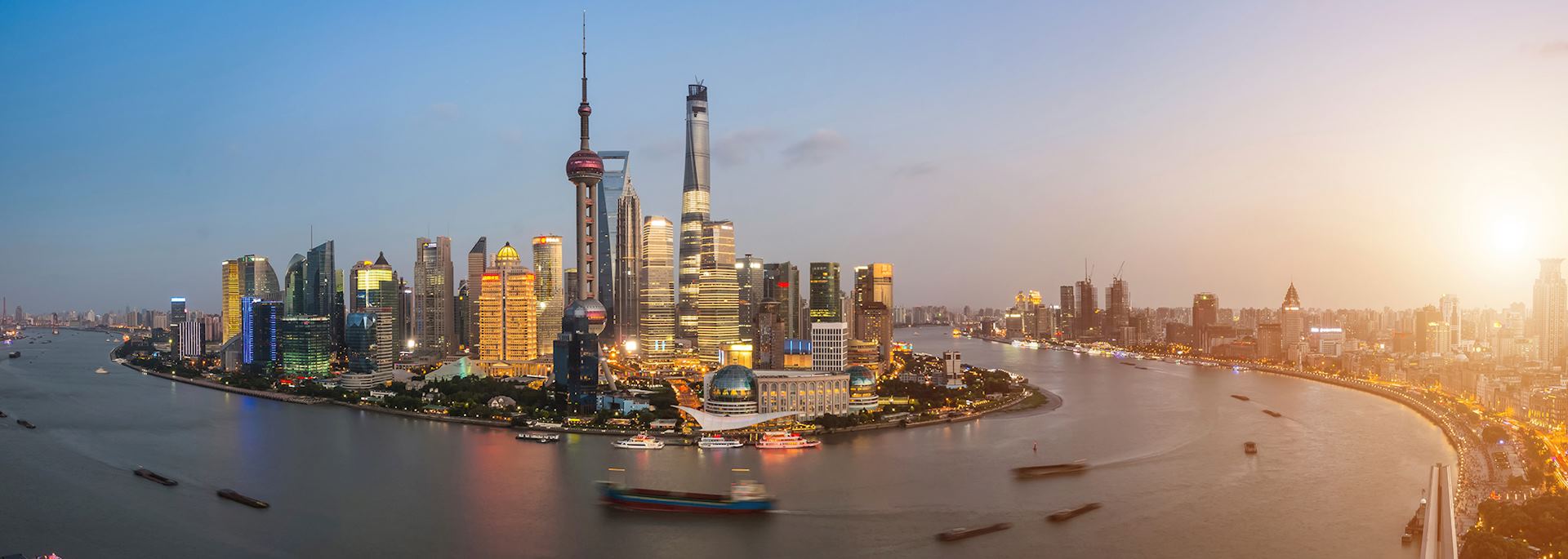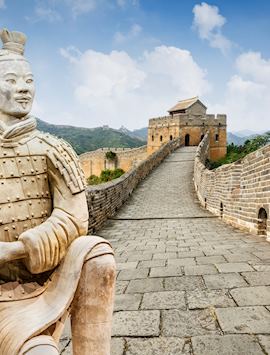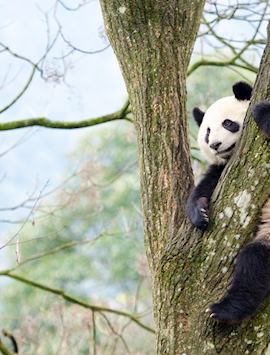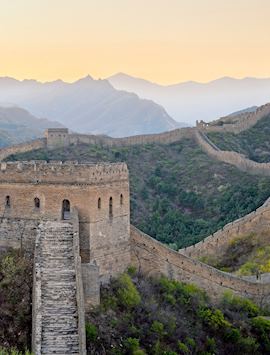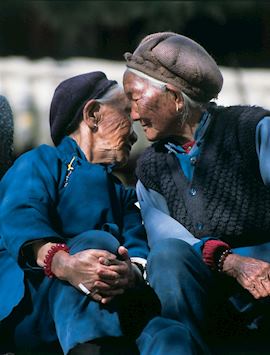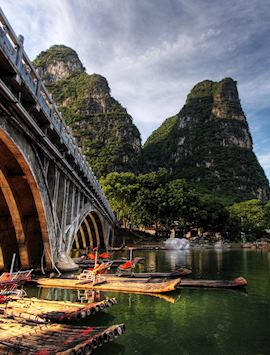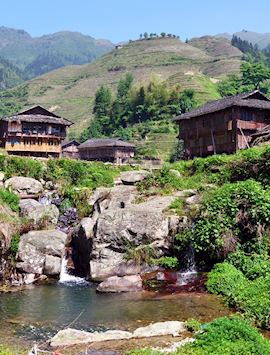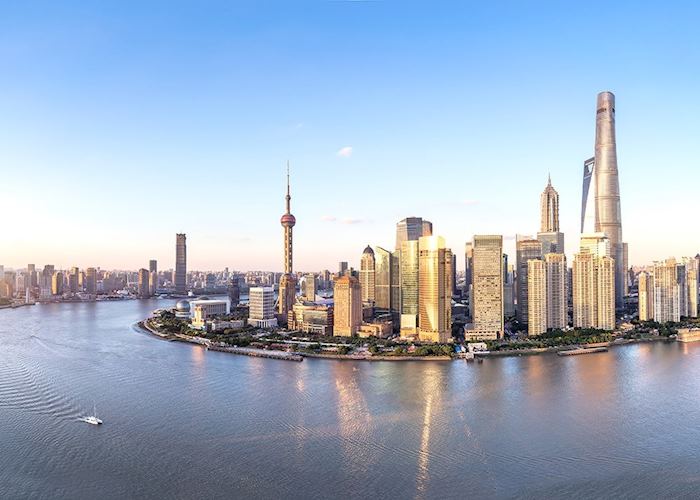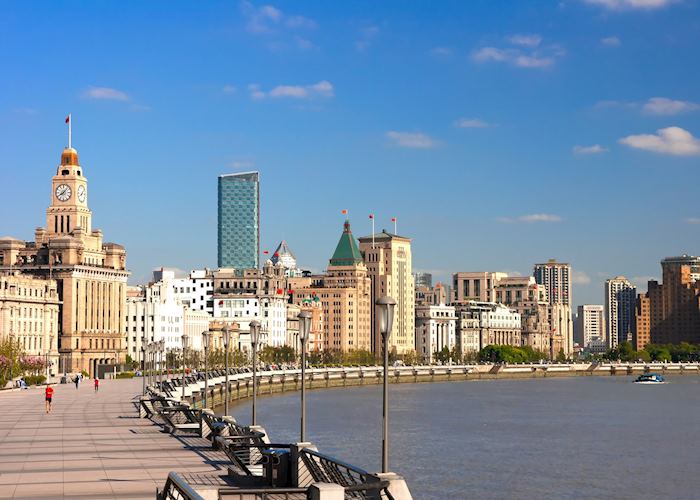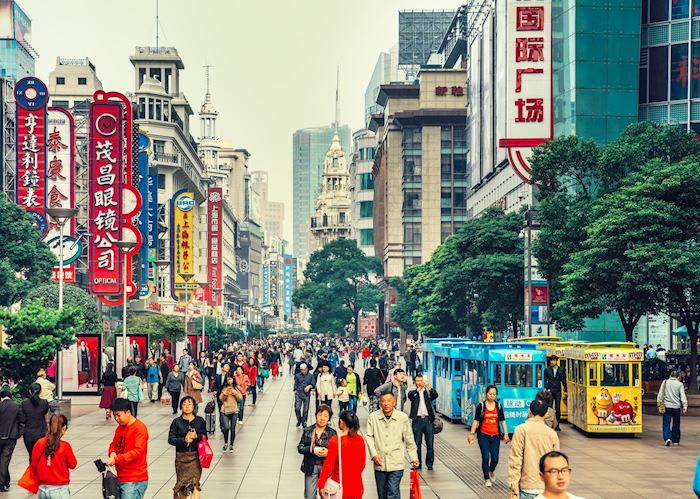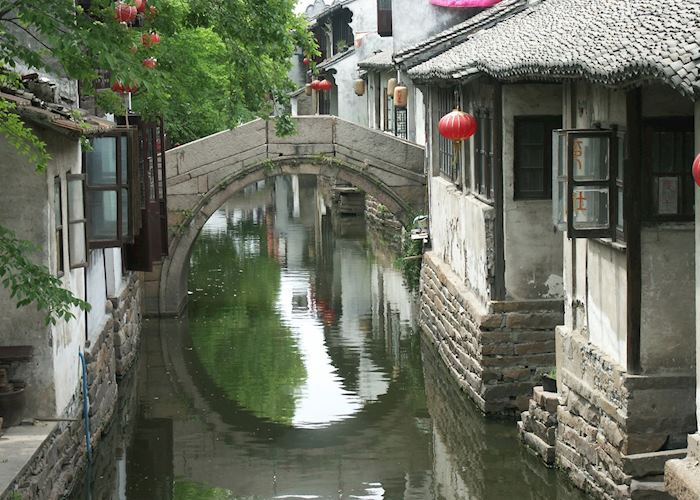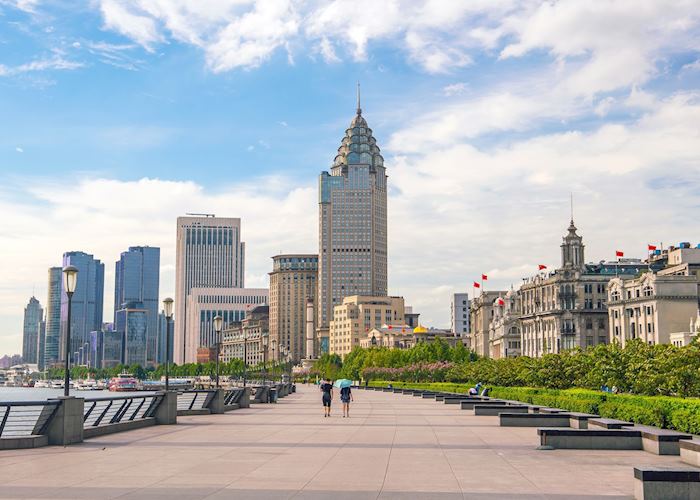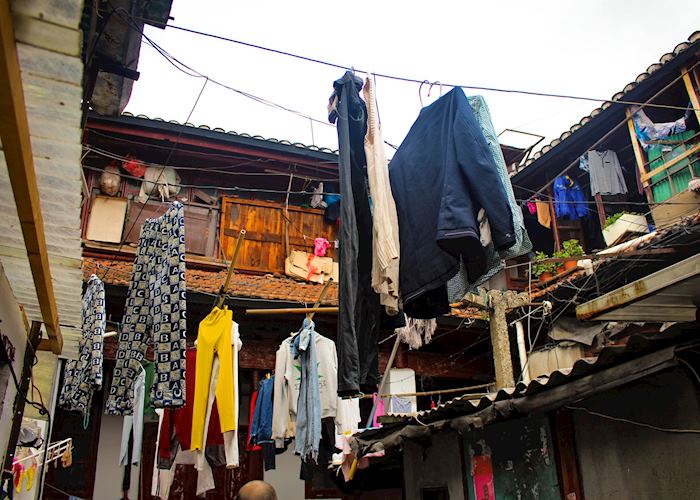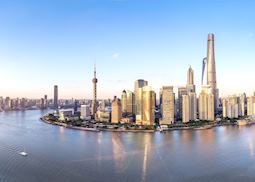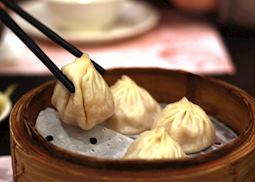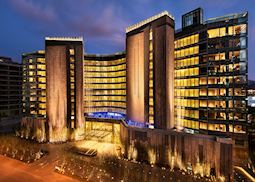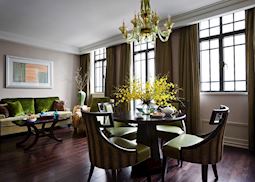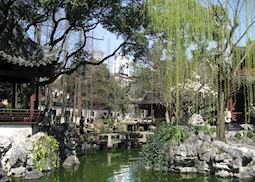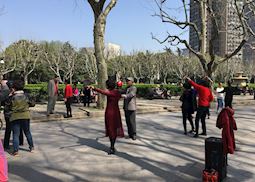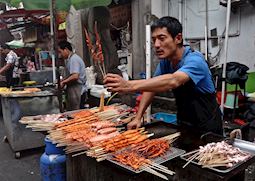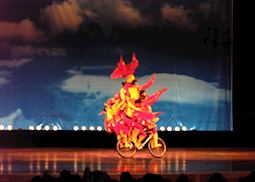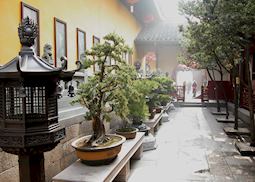Jump to:
Shanghai is a bullish China for the 21st century and beyond, a city buttressed by both European colonial relics and futuristic skyscrapers. Its calling card is the spiky skyline of the Pudong district. At night, this waterfront assortment of angular glass-and-steel oblongs lights up in bright cobalts, reds, purples and greens.
Patterns snake and flash up the buildings’ sides. The Oriental Pearl Tower’s trademark sphere glitters like a disco ball. Opposite lies the Bund, a promenade overlooking the Huangpu River, and a corridor for no less than 22 heritage buildings, including neoclassical former custom houses and Art Deco banks.
Branching off from the Bund are streets replete with fine restaurants, bars and international hotels — opportunity aplenty for China’s nouveau riche and millennials to show off their purchasing power.
Heading downriver, you reach the first real pocket of pre-20th-century Shanghai. Yuyuan Garden, a restored Ming-era walled retreat, offers some respite from its surrounding bazaar, which teems with souvenir sellers and snack stalls.
The garden is an enclave of rockeries, koi-filled ponds, wooden halls, 300-year-old wisteria, moon gates, and little pagodas. High-rises peek out from behind the magnolia, maple and ginkgo trees.
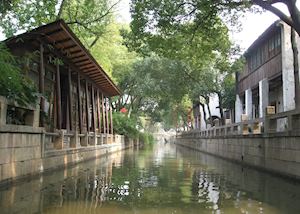 But, a meeker, more low-key Shanghai still exists in the rabbit warren of the old town, and the lilongs (alleyways) and traditional shikumen (stonegate) housing of the French Concession. They’re best explored via a guided cycling tour.
But, a meeker, more low-key Shanghai still exists in the rabbit warren of the old town, and the lilongs (alleyways) and traditional shikumen (stonegate) housing of the French Concession. They’re best explored via a guided cycling tour.
This is where old-world Shanghai clings on, impervious to the galloping development engulfing the city. Washing is strung up along the roadsides, mo-bikes (motor-driven tuk-tuks) squeeze past you down impossibly slender backstreets.
Through open doorways, you’ll glimpse groups huddled around mahjong tables in small, darkened rooms. Pyjama-clad residents glide past on bicycles, or sit outside their doorways, knitting, chatting, smoking, absorbed in a game of chess, or playing with babes-in-arms.
Some of the lilongs have a village-like atmosphere. Fruit and vegetable stalls, and little wet markets (full of trays swimming with live fish) congregate on tiny crossroads. And, old customs live on. You needn’t hand over money for spring onions (scallions) when buying your wares from a vegetable cart — they’re still dished out for free, just as they were during wartime.
Many of the ramshackle lanehouses lining the lilongs were once owned by White Russian émigrés and now house several families living cheek-by-jowl. Some houses bear stone carvings of flowers or the fleur-de-lys, copied from the Art Deco villas of the leafier areas of the French Concession. (Shanghai has the highest number of Art Deco buildings of any city in the world — you can even take a private tour focused on exploring its most arresting examples).
The French Concession is also home to a small museum dedicated to Maoist propaganda poster art, some out-of-the-way Buddhist temples, and parks with topiary hedging and lawns. Here, you’ll see residents gathering to take part in any number of activities, from diabolo spinning to t’ai chi, from water calligraphy to partnered folk dancing.
Moving back toward the riverfront, commerce and modernity takes over. Neon-lit Nanjing Road is crammed with shops and global chains, while the districts of Tianzifang and Xintiandi contain bijou stores and galleries in recreated back lanes masquerading as an older Shanghai.
But, you can find an altogether edgier side to contemporary Shanghai in M50, a former industrial quarter of disused factories taken over by young, independent artists and designers.
Best time to visit Shanghai
Avoid the first days of May and October, which coincide with busy public holidays in China. Aim instead for late March to May or late September to October, when the weather is warm and rain rare.
who's been there
-
01993 838 92501993 838 220
- Make an enquiry
Suggested itineraries featuring Shanghai
Our itineraries will give you suggestions for what is possible when you travel in Shanghai, and they showcase routes we know work particularly well. Treat them as inspiration, because your trip will be created uniquely by one of our specialists.
Places near Shanghai
- Suzhou 54 miles away
- Hangzhou 103 miles away
- Moganshan 104 miles away
- Nanjing 170 miles away
- Huang Shan 209 miles away
Photos of Shanghai
Our expert guides to exploring Shanghai
Written by our specialists from their own experiences of visiting Shanghai, these guides will help you make the most of your time there. We share both our practical recommendations and the best ways to appreciate Shanghai at its best.
-
China’s modern cities: Shanghai and Hong Kong ![Pudong, Shanghai]()
China’s modern cities: Shanghai and Hong Kong
China’s modern cities: Shanghai and Hong Kong
Mixing Chinese and European cultures, Shanghai and Hong Kong bridge the gap between East and West and often mark the start or finale to a China holiday. Specialists Susan and Kara outline the best ways to take in their shimmering skylines and quieter corners.
Read this guide -
A guide to Chinese food (and where to find it) ![Dumplings, China]()
A guide to Chinese food (and where to find it)
A guide to Chinese food (and where to find it)
There’s more to Chinese food than Western takeaways let on. Each region of China has its own distinct cuisine, from the west’s hot and spicy delicacies to the hearty dishes of the north. China specialists Anthony and Duncan discuss the best ways to experience food in China.
Read this guide
Accommodation choices for Shanghai
We've selected a range of accommodation options for when you visit Shanghai. Our choices usually come recommended for their character, facilities and service or location. Our specialists always aim to suggest properties that match your preferences.
-
![The Fairmont Peace Hotel, Shanghai]()
Fairmont Peace Hotel
Shanghai -
![Central Hotel, Shanghai]()
Central Hotel
Shanghai -
![Les Suites Orient, Shanghai]()
MaxX by Steigenberger Shanghai
Shanghai -
![Banyan Tree Shanghai on the Bund, Shanghai]()
Banyan Tree Shanghai
Shanghai -
![Bel Etage Suite, Shanghai Yangtze Boutique Hotel]()
Shanghai Yangtze Boutique Hotel
Shanghai -
![Approach to The Peninsula, Shanghai]()
The Peninsula
Shanghai
Ideas for experiencing Shanghai
Our specialists seek out authentic ways to get to know the places that could feature in your trip. These activities reflect some of the experiences they've most enjoyed while visiting Shanghai, and which use the best local guides.
-
Shanghai Highlights ![Yuyuan garden, Shanghai]()
Shanghai Highlights
Shanghai Highlights
Shanghai has very few Buddhist temples, so the Jade Buddha Temple is well known and well used. The Yuyuan Garden and Bazaar are located at the south-eastern end of the old city, its bustling maze of narrow lanes lined with traditional houses.
View details -
Morning Shanghai Bicycle Tour ![Fuxing park on Morning Shanghai bicycle tour, Shanghai]()
Morning Shanghai Bicycle Tour
Morning Shanghai Bicycle Tour
This guided cycling tour around Shanghai’s old town and French Concession backstreets shows you a salt-of-the-earth side of the city that few visitors experience. You’ll pass tiny street markets, and stop off at a public park and a Buddhist temple.
View details -
Culinary Tour of Shanghai ![Food vendor in Shanghai]()
Culinary Tour of Shanghai
Culinary Tour of Shanghai
Visit Zhonghua market in Shanghai and wander down some of the famous side streets sampling regional delicacies with a guide, who will be able to give you all sorts of recommendations.
View details -
Shanghai Acrobatics ![Shanghai Acrobatic Show]()
Shanghai Acrobatics
Shanghai Acrobatics
Gifted Chinese acrobats perform the contortions and feats of balance that have made them famous throughout the world.
View details -
Suzhou Excursion ![Suzhou, China]()
Suzhou Excursion
Suzhou Excursion
Suzhou is a city with over 2,500 years of history. Following completion of the Grand Canal in the Sui Dynasty, the town grew and prospered from the trade that passed through its gates.
View details
